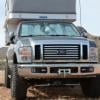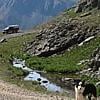If it is illegal it must be so for a good reason.
There's probably a reason, but I can't see it being based on physics or chemistry -- i.e., it must not be a physical reason.
A rubber hose connecting the portable heater to the camper internal propane network (with a hose-barb at each end of the hose) is
less likely to leak than a system of copper tubing and brass fittings.
The rubber hose itself will not spring a leak -- at least, not against the 0.4psi pressure downstream of the propane regulator. And the seal of the hose to the hose barb is a perfect seal (at these pressures) because the hose is pliable and conforms itself to the ridges/barbs of the hose-barb -- unlike metal-to-metal fittings, which have to be seated and tightened correctly to work.
Really, the pressure is so low that a hose made of Saran Wrap and duct tape might be strong enough to contain it (but I wouldn't advise trying it).
A propane dealer (owner/manager) sold me the parts (rubber hose, shut-off valve and a couple of adapting fittings), and he knew where/how I was going to use them. I asked the Propane Guy, "Do I need a hose clamp to secure the hose to the hose-barb?" Propane Guy: "No, it
can't pop come off from the tiny pressure of the propane...in fact, if you want to remove it you'll probably have to cut it off".
As for the use of quick-disconnects, their typical use is
much higher pressures than found in low-pressure propane, so I can't see how those would leak either (nevertheless, I added a shut-off valve upstream because there was
no downside to doing so.)
Then why do RVs come with a propane detector? Probably in case a stove burner may not get turned off all the way....or a metal fitting might not be tightened properly and travel flexing/vibration could cause it to start leaking. Rigid tubing/fittings are more prone to loosening from vibration/torquing than flexible rubber.
On the other hand...if someone doesn't understand this stuff themselves then they should definitely pay a professional to do it and be bound by those rules.
From a practical standpoint, a "portable"
radiant heater (like the Buddy or Wave) that was
rigidly mounted and couldn't be pointed where I wanted the heat most wouldn't be very useful (to me) in such a small space.
If it is illegal it must be so for a good reason.
That's why I rarely exceed the speed limit -- because auto accidents
are the biggest cause of accidental death.

















